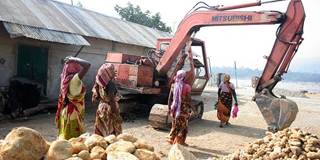The international community has time and again reaffirmed its intent to stamp out corruption, most recently last year, when the UN adopted the Sustainable Development Goals. And now new research from Bangladesh points such efforts in a promising direction.
COPENHAGEN – Corruption is a huge problem across the globe. In Africa, it is estimated that one-quarter of the continent’s GDP is “lost to corruption each year.” In Latin America, the Inter-American Development Bank believes that corruption may cost 10% of GDP every year. In the only comprehensive overview based on surveys of businesses and households, the World Bank puts the total direct cost of corruption at $1 trillion annually.
The international community has time and again reaffirmed its intent to stamp out corruption, most recently last year, when the United Nations adopted the Sustainable Development Goals. Yet, as the Copenhagen Consensus, the think tank I head, has documented, for all the well-intentioned policies, there have been few successes.
One study examined the 145 countries that introduced institutional reforms with the support of the World Bank or other donor agencies from 1998 to 2008. Comfortingly, government effectiveness improved in half the countries. Unfortunately, effectiveness actually worsened in the other half, suggesting no overall effect.

COPENHAGEN – Corruption is a huge problem across the globe. In Africa, it is estimated that one-quarter of the continent’s GDP is “lost to corruption each year.” In Latin America, the Inter-American Development Bank believes that corruption may cost 10% of GDP every year. In the only comprehensive overview based on surveys of businesses and households, the World Bank puts the total direct cost of corruption at $1 trillion annually.
The international community has time and again reaffirmed its intent to stamp out corruption, most recently last year, when the United Nations adopted the Sustainable Development Goals. Yet, as the Copenhagen Consensus, the think tank I head, has documented, for all the well-intentioned policies, there have been few successes.
One study examined the 145 countries that introduced institutional reforms with the support of the World Bank or other donor agencies from 1998 to 2008. Comfortingly, government effectiveness improved in half the countries. Unfortunately, effectiveness actually worsened in the other half, suggesting no overall effect.